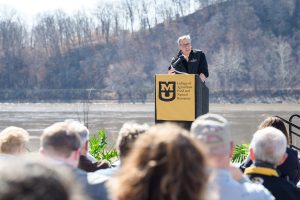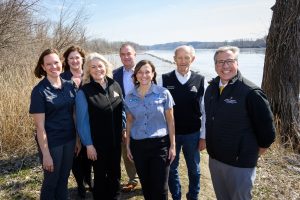Through a partnership with the Missouri Department of Conservation (MDC) and the Missouri Conservation Heritage Foundation (MCHF), the University of Missouri’s College of Agriculture, Food and Natural Resources made a joint announcement featuring the launch of its new Institute of Fisheries, Wetlands and Aquatic Systems today.
“Clean water and healthy aquatic systems are vital for our global future,” said Mun Choi, University of Missouri president. “This Institute will be a crucial resource for citizens, government entities and private industries committed to this mission in the years to come, and MU is proud to be a driving force in that mission moving forward.”
The establishment of the institute is made possible through a $1.7 million gift from an anticipated $30 million endowment held by MCHF, whose mission is to enhance the conservation of Missouri’s forest, fish and wildlife resources. MCHF and its donors and partners are committed to building the endowment over the next 10 years for the continued operation of the institute. The endowment will help hire the institute director and two assistant professors.

“This new public-private partnership is a great benefit to the entire state of Missouri,” said Michael Williams, chair of the UM System Board of Curators. “The research and work done by MU is essential for the health and wellbeing of Missourians and this institute will help preserve a rich and vibrant environment and water systems for generations to come.”
The institute will support cultivating conservation professionals through workforce development, research and public policy. Specifically, it will:
- Provide future generations access to coursework focused on fisheries, wetlands and aquatic systems with an emphasis on research, academics and service.
- Build regional and national partnerships to collaboratively address water issues.
- Conduct key, cutting-edge interdisciplinary research.
- Develop and support public policy.
- Communicate knowledge gained through an array of platforms.
- Build a pipeline of talent to benefit conservation agencies and organizations across the country.
“We appreciate and support the Missouri Conservation Heritage Foundation’s mission to provide future generations with public access to the world-class fishing, healthy aquatic habitats, clean water and productive agricultural and natural resource economies that we all enjoy today,” said Jackie Lewis, vice chancellor for advancement. “Today marks the latest milestone in the relationship between the University of Missouri and the great state we serve.”
Aquatic systems are composed of the entire ecosystem within a body of water — a wetland, lake, river, stream or pond. Quality management of these systems provide clean water and recreation for people and wildlife habitats.
“As a nonprofit supporting the mission of the Missouri Department of Conservation, we are honored to work with multiple partners and donors on a legacy opportunity that develops inspired and educated conservation stewards,” said Tricia Burkhardt, executive director of MCHF. “These future leaders will have a lasting impact on our precious water resources. We are grateful for our generous donors who believe in our vision and help make it a reality.”
The vision of the institute is to create a national model for public-private partnerships that advance sustainable conservation and management of fisheries, wetlands and other aquatic systems by integrating areas of study that often have been addressed separately.

“This new institute will be a national model for how we positively leverage the power of partnerships to bring together fisheries, wetlands and other aquatic systems into one integrated area of study to not only further science, but also develop future talent in the conservation field,” said Sara Parker Pauley, director of MDC. “We would not be at this pivotal point without the shared vision and dedication of our great partners here in Missouri.”
In addition to the essential workforce development that will enable the MDC to continue supporting the state’s aquatic systems to the highest standards, the partnership will provide valuable educational opportunities for students including internships, cooperative education experiences and graduate assistantships.
“Through this valuable partnership, our students will have access to real-world educational opportunities that will greatly enhance their learning and overall experience during their time with us,” said Christopher Daubert, vice chancellor and CAFNR dean. “These kinds of educational experiences make our graduates stand out from the crowd in the workforce, and we are proud of the role we can play in conserving aquatic systems in Missouri and beyond for future generations.”
Eric Kurzejeski, program director in the School of Natural Resources and former outreach programs chief at MDC, has been named interim director of the institute. A national search to find a permanent director will begin immediately. Learn more about the institute on CAFNR’s School of Natural Resources’ website.